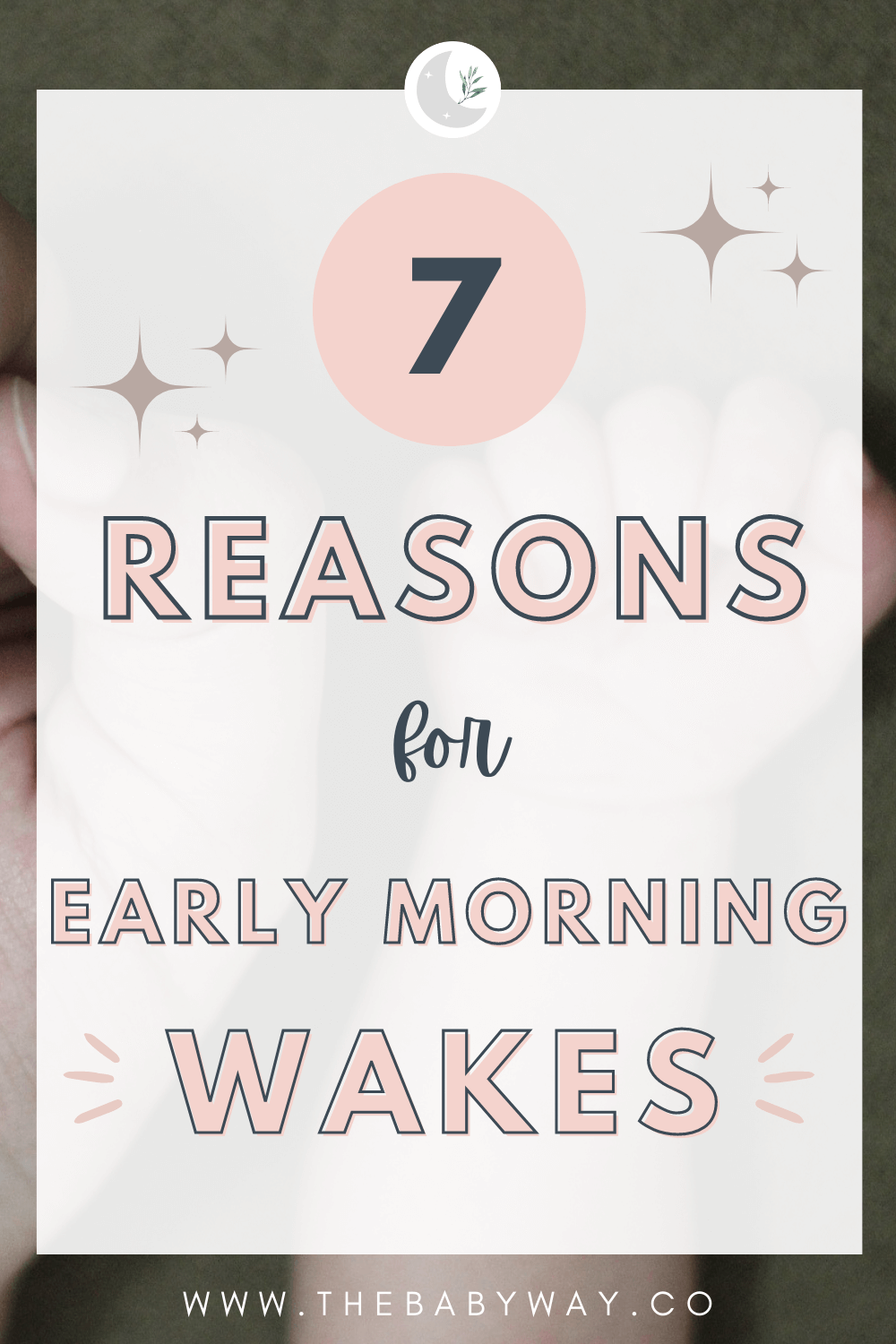Is your baby waking early in the morning? Here are 5 Tips that will help you manage early morning wakes
Do you remember when you used to sleep in until 10 AM on weekends?
Me neither.
When I was a fresh mama, I always used to wonder if I will ever sleep past 7 AM again.
Let's find out what makes your baby an early riser, why children wake up so early, and how long they should sleep.
How early is too early?
Babies and toddlers are naturally early risers. Their bodies are designed to go to bed early and wake up early. If your baby's waking hour is between 6-8 AM, then your little one is actually in a pretty good range.
I have seen parents trying desperately to get their baby to sleep until 8 AM or past it, but even 8 AM is rare. Having a late bedtime will not work and probably backfire. Remember how I told you that when it comes to baby sleep, you need to remind yourself that it does not work like adult sleep, and everything seems unlogical (for us adults). Only children older than 3-4 are able to sleep a tiny bit longer in the morning (and by tiny, I mean a maximum of 9 AM).
What is an early morning waking, aka early rising?
We talk about an early wake when your baby wakes before 6 AM. Those babies usually wake between 4-6 AM and are ready for the day. Every wake time after that is normal for babies.
Getting those babies back to sleep is nearly impossible. Even a feeding or trying to rock them back to sleep fails. Every parent can tell when their baby is UP, right?
The Causes Of Early Morning Wakes And What To Do
There can be several reasons why your baby wakes up so early. Sometimes multiple reasons apply at the same time.
Reason 1: The Sleep Environment
Sometimes babies are not sleeping in a sleep-inducing sleep environment. Sleep pressure and melatonin are low during the early morning hours. A baby's sleep cycle also consists of less deep sleep, and babies transition to much lighter sleep. This makes babies wake much easier when they hear something, are hot or cold, or light comes in. The latter can especially be a sleep disruption in the summer. As soon as children see the first sunbeams peeking through their window, they think they have to get up for the day.
Solution: Create the right sleep environment for your baby. Make sure the room has the right temperature and use white noise to mask outside noises. And invest in good blackout curtains. These are one of the best investments for a long time because even a young child older than 3 will not go back to sleep once they notice the sun has risen.
Reason 2: Too Early Bedtime
I believe the majority of parents think that their baby is not getting enough sleep. We expect our little ones to sleep 12 hours at night and still nap half the day. But the truth is that most babies have much slower sleep needs. Both my children were fine with 10 hours of sleep at night and 1-2 hours of nap time. Sleep needs vary from baby to baby, and only because a sleep consultant made you believe they need to sleep 12 hours it doesn't have to be true.
By the way, a too early bedtime can also lead to split nights.
Solution: To figure out the right bedtime, you should observe your child's tired cues, their behavior throughout the day and keep an eye on her awake time. When a baby has a too-early bedtime, all their naps of the day are usually too early as well. They get tired very early in the evening. But continuing to put your baby early to bed will reinforce the early waking. You might need to slowly delay that first nap of the day to achieve a later bedtime. A bedtime between 7:30-8:30 is most common for babies and young children. For very young infants (newborn to 2 months), bedtime can be even as late as 10 PM.
Reason 3: Too Late Bedtime/ An Overtired Baby
Some parents try a late bedtime in hopes that their baby will sleep longer in the morning. But this only works in very, very rare cases. Baby sleep does not work that way. If they nap poorly during the day or go to bed too late, it can lead to more frequent night wakings and early morning wakes.
Solution: Having an overtired baby on your hands is much easier to figure out than an undertired baby. Overtired babies are usually much fussier, cry while going to sleep, or even seem to fight sleep. They also wake more often at night. And when they wake early in the morning, they are not in a good mood and get very tired again after 45-60 minutes.
Have an earlier bedtime to prevent your baby from getting overtired during bedtime.
Reason 4: Too Much Daytime Sleep
Similar to having a too early bedtime, too much daytime sleep can also lead to early wakings. Your baby only needs a certain amount of sleep distributed over 24 hours. If they get that sleep during the day, they will sleep less at night.
I mean, I get it. Waking a sleeping baby is never really fun. For one, you have a peacefully sleeping baby, and you got to sit down, and now you have to wake them. Every one of us would enjoy 15 more minutes of some quiet time. Secondly, sometimes babies are grumpy when you wake them.
Solution: There is really nothing else to do but to cap that nap. Start shortening morning and afternoon naps first because your little one will drop those first. Then usually, at 13-14 months, most babies only have one nap midday. You may need to shorten that nap when they get closer to 2 years. My 2-year-old needed only 45 minutes of sleep during the day so that we could keep a bedtime of 9 PM!
Sleep needs can also change in very little time. Even after a month, you might need to adjust your sleep schedule. In the baby world, 15 minutes less sleep can make a big difference.
Reason 5: A Habitual Wake
A habitual wake usually comes along with another cause of early wakes, such as an early bedtime or too much daytime sleep. This is because your baby's sleep pattern has shifted, and their circadian rhythm has adjusted to the new waking hour. Now their internal clock continues to wake them early in the morning.
Solution: If your baby's early wakes have become habitual, it can take some time to readjust their circadian rhythm. You slowly need to delay bedtime and try to get your baby back to sleep in the morning.
Now that is not an easy task and can sometimes take 20-40 minutes. But the goal is to make your baby and your baby's body understands that it's not wake-up time. Treat their waking like a night waking. Keep it quiet and dark. Don't unnecessarily interact. If your baby is happy and content in the crib, let them stay there. If you assume they might be hungry, feed them.
But remember not to let them sleep too long in the morning if you get them back to sleep. Wake your baby at 8 AM at the latest. Otherwise, you risk having a too late bedtime.
Reason 6: The First Nap Is Too Early
Babies can get tired in the morning very fast. Sleep pressure is higher than at any other time of the day. So babies often show first tired signs after 45-60 minutes.
Having the first nap of the day too early will also bring forward all the other naps of the day, including bedtime. Your baby's internal clock is shifting to a rhythm where they wake very early and go to bed very early.
Solution: In this case, you also have to shift your baby's sleeping hours forward. Try to delay the first nap of the day gradually. Even if your baby gets slightly overtired, it is usually not such a big deal during this time of the day. They still fall asleep quite fast due to high sleep pressure.
Reason 7: Hunger
Despite the belief that after 6 months, a baby does not need night feedings anymore, it is very common that even babies older than 12 months wake up due to hunger. I mean, even I sometimes wake up at night and am hungry! And unlike babies, I live mostly on carbs, not purees, liquids, vegetables, and fruits.
If your baby has no or only very few feeds, then there is a good chance they are hungry. Going through the whole night without a feed is a very long time.
Solution: If you assume hunger, give your baby a feed no matter how old they are! You can still eliminate this feed in the future. Remind yourself that every day your baby gets closer to the milestone of sleeping through the night, so don't be afraid of a bad sleep association or a baby that has to give up feeds.
You can also try a dream feed if your baby is not waking during the first hours of the night. Offer an additional feed later at night (around 11 PM).
Other Possible Reasons
Besides the more common reasons above, developmental milestones or illnesses can also cause early wakings. A sleep regression or developmental leaps also lead to poorer sleep. Also, sickness or teething can lead to early wakings.
Is my baby waking because of a bad sleep association?
Even though independent sleep skills are the go-to answer for many sleep specialists, it's not the case. Good sleep habits are, of course, an important factor for good baby sleep. But if your baby is sleeping just fine throughout the night, then something else is going on that wakes them so early in the morning.
Why Are Early Morning Wakes So Difficult?
The problem with early morning wakes is that they can take time to resolve and be more challenging. Your baby's sleep pattern has changed by compensating missed nighttime sleep with daytime sleep, and their circadian rhythm has grown into this new pattern.
Correcting early rises usually takes a few days or sometimes even up to two weeks. The important thing is that you stay consistent and give your new routine some time. There is never really a quick fix for sleep issues, but once you have figured out the cause, you can start working on it from there.









